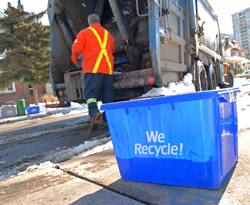Mutual learning for better waste management
Steps are needed to reduce, reuse and recycle municipal solid waste and waste arising from commercial, construction, demolition, industrial, mining and agricultural activities. The best approaches to disposal and energy recovery from waste should also be identified. The EU-funded 'Waste management focusing on knowledge and integration to create transnational economic development' (WASTEKIT) project analysed municipal solid waste management in Sofia (Bulgaria), the Emilia Romagna region (Italy), the Amsterdam Metropolitan District (the Netherlands), and the Yorkshire and Humber region (United Kingdom). The focus in these regions was on funding and spin-off projects, options for plastics, technologies to convert waste to energy, and knowledge transfer and public understanding. Project partners also specifically looked at strengthening local research and technological development, innovation and infrastructures. They succeeded in this regard by fostering collaborations between universities, research centres, enterprises and regional authorities. The lessons that came out of these efforts have been compiled into a mentoring guide for regions that are less technologically developed. The guide describes mutual learning activities centred on cultural, planning, policy and finance issues as an effective way to share knowledge between stakeholders. WASTEKIT organised one such event in Sofia by making use of roundtable sessions. Other outcomes included an assessment of the state of the art for thermal and biological waste treatments, as well as waste collection and separation. Networking among relevant members of the public sector, the private sector, academia and charities was also encouraged. WASTEKIT recognised that different regions have individualised waste management strategies and that an exchange of know-how could lead to best practices and development for other regions. It has initiated regional and international partnerships to facilitate mutual learning that will create new opportunities for research-driven waste management.

